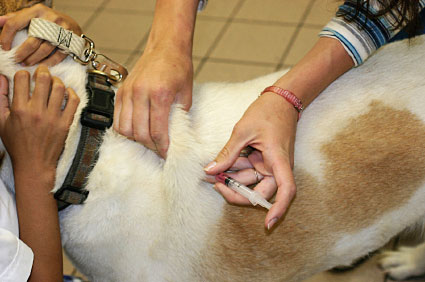Aside from hypoglycemia (low blood sugar), what are some other complications that might occur if one changes a dog's insulin dose everyday? Will this help to find a better dose?
1 Answer
For dogs with diabetes, it is all about regulation. It will always take time to regulate a diabetic dog, and get in sync with their blood glucose levels. It is important to work with your veterinarian to find the right dosage for your dog.
Daily insulin injections are essential to control the blood glucose level in your dog. Your veterinarian will work with you to determine the right dose of [insulin]. This process may take a few weeks, but the end result is very manageable. Some diabetic dogs may require only one injection per day, while others may require twice-daily injections. Once you and your dog have established a routine, things will be easier and your dog will be healthier. The key to success is patience with the learning process. The payoff will be a noticeable improvement of your dog’s condition and quality of life over time.

From VetSulin.com on how long it takes to regulate a diabetic animal:
Each dog's case is different. There is no way to put a specific time on it. Sometimes the regulation process will require you to try different dosages, diets, and one to multiple injections a day. Regulation can be achieved sometimes within a month, and in some cases, over a year from the time therapy first started. It is very important to work closely with your veterinarian during this process to avoid further complications. Even after your dog is regulated, you will still need to maintain this relationship with your dog's veterinarian. Frequent check-ups will be necessary to maintain good health.
If not regulated properly, complications may occur, which includes hypoglycemia, or low blood sugar, as you mentioned. Other complications include diabetic ketoacidosis (DKA), which occurs when cells do not get the amount of glucose they need to produce energy, and the body starts to break down muscle and fat instead.
I am sure that if you work with your veterinarian to find the right range of insulin for your dog, and your dog is within its acceptable blood glucose level, then there should be no harmful effects to your dog. However, it would be ideal to discuss this with your veterinarian on your next visit.
There is a good article on maintaining your dog's blood glucose levels at K9Diabetes.com, all with referenced material.
-
The picture does not even properly show how to administer the injection. Commented May 16, 2014 at 23:55
-
1The picture wasn't meant to show how to administer the injection, as I assumed if asking about 'changing the dose' you would already know how to do this. It also has nothing to do with the question asked. I suggest pets.webmd.com/dogs/how-to-give-a-dog-insulin if you are having difficulty.– BunkCommented May 17, 2014 at 0:46